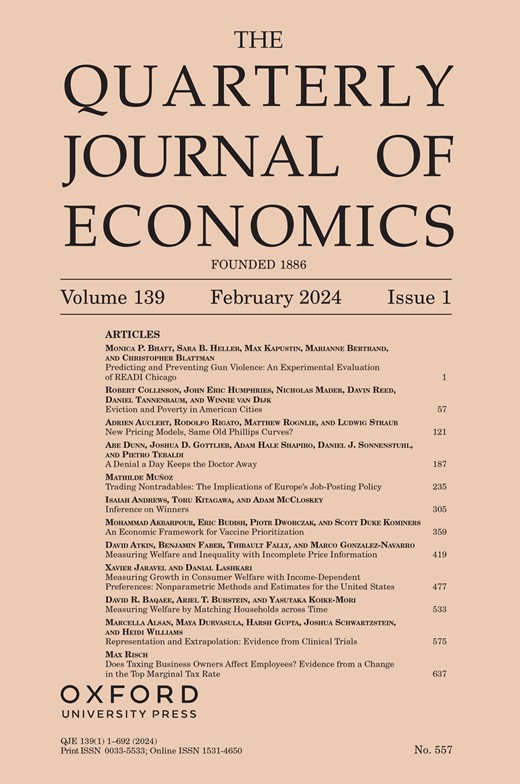从通胀经验中学习
IF 12.7
1区 经济学
Q1 ECONOMICS
引用次数: 745
摘要
个人如何形成对未来通胀的预期?我们认为个体在其一生中都经历过超重通货膨胀。这种方法修改了现有的自适应学习模型,允许根据年龄对预期进行更新,以应对通胀意外。年轻人比老年人更强烈地更新他们的期望,因为最近的经历在他们积累的一生历史中占据了更大的份额。我们使用路透/密西根消费者调查(Reuters/Michigan Survey of consumer) 57年来有关通胀预期的微观数据来支持这些预测。经历的差异强烈地预示着预期的差异,包括在高度波动的通货膨胀时期,如20世纪70年代,年轻人和老年人之间的巨大差异。它还解释了家庭借贷行为,包括抵押贷款的选择。JEL代码:E03, G02, D03, E31, E37, D84, D83, D14。本文章由计算机程序翻译,如有差异,请以英文原文为准。
Learning from Inflation Experiences
How do individuals form expectations about future inflation? We propose that individuals overweight inflation experienced during their lifetimes. This approach modifies existing adaptive learning models to allow for age-dependent updating of expectations in response to inflation surprises. Young individuals update their expectations more strongly than older individuals since recent experiences account for a greater share of their accumulated lifetime history. We find support for these predictions using 57 years of microdata on inflation expectations from the Reuters/Michigan Survey of Consumers. Differences in experiences strongly predict differences in expectations, including the substantial disagreement between young and old individuals in periods of highly volatile inflation, such as the 1970s. It also explains household borrowing and lending behavior, including the choice of mortgages. JEL Codes: E03, G02, D03, E31, E37, D84, D83, D14.
求助全文
通过发布文献求助,成功后即可免费获取论文全文。
去求助
来源期刊

Quarterly Journal of Economics
ECONOMICS-
CiteScore
24.20
自引率
2.20%
发文量
42
期刊介绍:
The Quarterly Journal of Economics stands as the oldest professional journal of economics in the English language. Published under the editorial guidance of Harvard University's Department of Economics, it comprehensively covers all aspects of the field. Esteemed by professional and academic economists as well as students worldwide, QJE holds unparalleled value in the economic discourse.
 求助内容:
求助内容: 应助结果提醒方式:
应助结果提醒方式:


